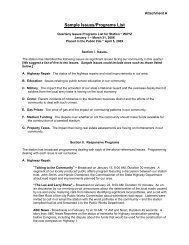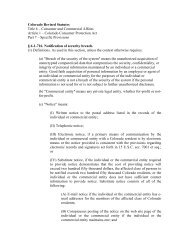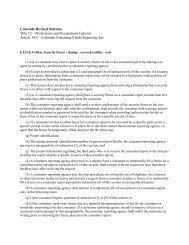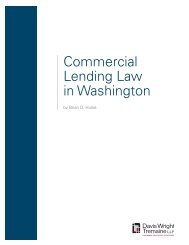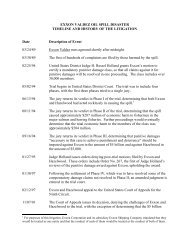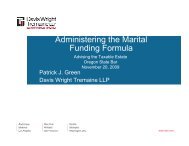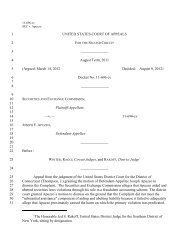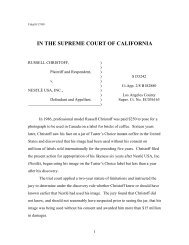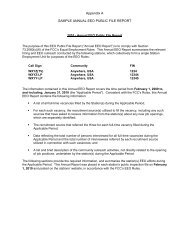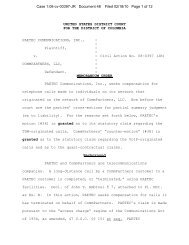QUANTA SERVICES INC, QUANTA SERVICES MANAGEMENT ...
QUANTA SERVICES INC, QUANTA SERVICES MANAGEMENT ...
QUANTA SERVICES INC, QUANTA SERVICES MANAGEMENT ...
You also want an ePaper? Increase the reach of your titles
YUMPU automatically turns print PDFs into web optimized ePapers that Google loves.
<strong>QUANTA</strong> <strong>SERVICES</strong>, <strong>INC</strong>. AND SUBSIDIARIES<br />
NOTES TO CONSOLIDATED FINANCIAL STATEMENTS — (Continued)<br />
inception of the contract, with the objective and strategy stated, along with an explicit description of the<br />
methodology used to assess hedge effectiveness. The dates (or periods) for the expected forecasted events and the<br />
nature of the exposure involved (including quantitative measures of the size of the exposure) must also be<br />
documented. At the inception of the hedge and on an ongoing basis, the hedge must be deemed to be “highly<br />
effective” at minimizing the risk of the identified exposure. Effectiveness measures relate the gains or losses of<br />
the derivative to changes in the cash flows associated with the hedged item, and the forecasted transaction must<br />
be probable of occurring.<br />
For forward contracts that qualify as cash flow hedges, Quanta accounts for the change in fair value of the<br />
forward contracts directly in equity as part of accumulated other comprehensive income (loss). Any ineffective<br />
portion of cash flow hedges is recognized in earnings in the period in which ineffectiveness occurs. For instance,<br />
if a forward contract is discontinued as a cash flow hedge because it is probable that the original forecasted<br />
transaction will not occur by the end of the originally specified time period, the related amounts in accumulated<br />
other comprehensive income (loss) would be reclassified to other income (expense) in the consolidated statement<br />
of operations in the period such determination is made. When a forecasted transaction occurs, the portion of the<br />
accumulated gain or loss applicable to the forecasted transaction is reclassified from equity to earnings. Changes<br />
in fair value related to transactions that do not meet the criteria for cash flow hedge accounting are recorded in<br />
the consolidated results of operations and are included in other income (expense).<br />
Comprehensive Income<br />
Comprehensive income includes all changes in equity during a period except those resulting from<br />
investments by and distributions to stockholders. Quanta records other comprehensive income (loss), net of tax,<br />
for foreign currency translation adjustments related to its foreign operations and changes in fair value of Quanta’s<br />
derivative contracts that were classified as cash flow hedges, as applicable.<br />
Litigation Costs and Reserves<br />
Quanta records reserves when it is probable that a liability has been incurred and the amount of loss can be<br />
reasonably estimated. Costs incurred for litigation are expensed as incurred. Further details are presented in<br />
Note 14.<br />
Fair Value Measurements<br />
The carrying values of cash equivalents, accounts receivable, accounts payable and accrued expenses<br />
approximate fair value due to the short-term nature of those instruments. For disclosure purposes, qualifying<br />
assets and liabilities are categorized into three broad levels based on the priority of the inputs used to determine<br />
their fair values. The fair value hierarchy gives the highest priority to quoted prices (unadjusted) in active<br />
markets for identical assets or liabilities (Level 1) and the lowest priority to unobservable inputs (Level 3). All of<br />
Quanta’s cash equivalents are categorized as Level 1 assets at December 31, 2011 and 2010, as all values are<br />
based on unadjusted quoted prices for identical assets in an active market that Quanta has the ability to access.<br />
In connection with Quanta’s acquisitions, identifiable intangible assets acquired include goodwill, backlog,<br />
customer relationships, trade names, covenants not to compete and software. Quanta utilizes the fair value<br />
premise as the primary basis for its valuation procedures, which is a market-based approach to determining the<br />
price that would be received to sell an asset or paid to transfer a liability in an orderly transaction between market<br />
participants. Quanta periodically engages the services of an independent valuation firm when a new business is<br />
acquired to assist management with this valuation process, which includes assistance with the selection of<br />
appropriate valuation methodologies and the development of market-based valuation assumptions. Based on<br />
91




